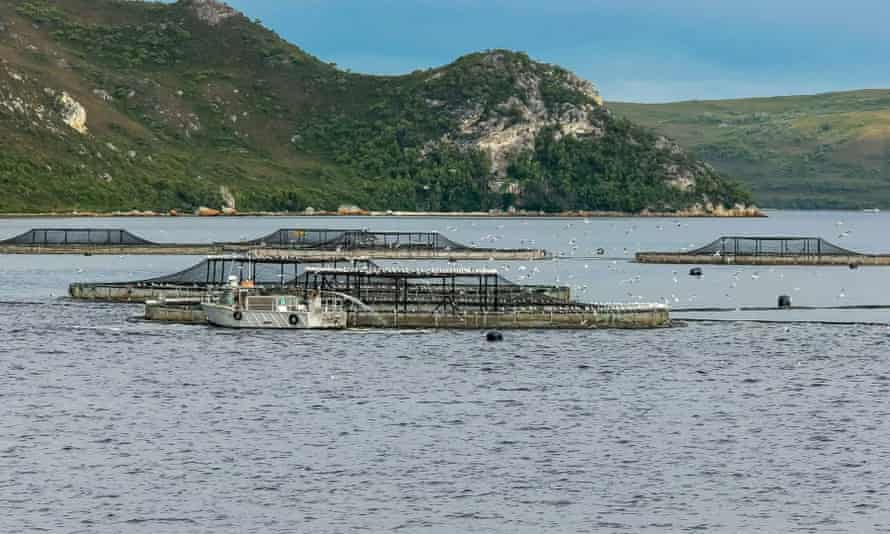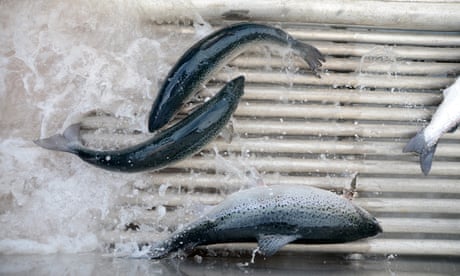Geoff Cousins says head of WWFA made the comments privately, despite the organisation having certified a major operator in the past

Salmon pens in Macquarie Harbour, Tasmania. A prominent environmentalist claims WWFA has privately admitted salmon farming in the state was ‘not sustainable’. Photograph: crbellette/Getty Images/iStockphoto
Royce Kurmelovs
Fri 3 Sep 2021
The head of World Wide Fund for Nature Australia admitted in private that Tasmanian salmon farming was “not sustainable”, despite WWFA having endorsed the industry’s practice through its certification program until 2019, environmentalist Geoff Cousins has said.
Cousins said the chief executive of WWFA, Dermot O’Gorman, made the comments last month after Cousins challenged the organisation over whether its former certification program had worked to protect the marine environment or wildlife.
WWFA confirmed to Guardian Australia that conversations took place, but did not immediately respond to questions about what was said.
The year after the 2018 Macquarie Harbour fish kill, when about 1.35m salmon and trout died, WWFA cut ties with Tassal, its industry partner, and commissioned Seafood Advisory Ltd to investigate the causes of the kill.
Its report, released on Wednesday, said the certification scheme had been successfully implemented over the six-year partnership between the organisations, but it had failed to prevent “adverse ecological outcomes”.
“The [Aquaculture Stewardship Council] standard has not been set up to ‘prevent’ adverse situations occurring in the first place, and the outcome-focused metrics are not flanked by requirements for mechanisms to address identified potential impacts before they ‘become established’,” the report said.

Tasmania’s salmon industry expansion has no sound scientific basis, expert who quit review panel says
While the WWFA released a public statement, it was not as strident as the private comments reported by Cousins, who kept notes from his conversations.
Advertisement
“I would have preferred they say it was unsustainable publicly,” Cousins said. “It did finally publish the report, it did finally issue a reasonably comprehensive statement and it was honest in saying there are major problems there.”
O’Gorman said on Friday: “This independent report makes it clear that the Tasmanian government must play the central role in addressing these issues to achieve the industry-wide reform.”
Tassal directed all questions to the Tasmanian Salmon Growers Association, whose spokesperson, Julian Amos, said the industry rejected the findings of the report “in the strongest possible terms”.
“Accreditation involves a rigorous process,” Amos said. “It is passing strange that the WWF took no action for more than three years and left it for five years before making any comment, and has not acknowledged action taken since that time.”
Jilly Middleton from Environment Tasmania said the report meant the industry could no longer “greenwash their product”.
“There were local groups of just one or two people that were passionate about their local waterway being trashed, who were organised and coordinated to speak up and lobby WWF,” Middleton said.
The Bob Brown Foundation and the Tasmanian Alliance for Marine Protection also welcomed the news and called for supermarkets to stop stocking the fish.
Booker prize winning author Richard Flanagan, whose book Toxic has galvanised the campaign against the industry in recent months, said the pressure was now on the RSPCA to withdraw certification from Huon, another major fish farming operation.
“The industry cannot go on as it is and needs to fundamentally transform – or it will collapse,” Flanagan said.
Few details exist about the RSCPA’s certification scheme, though its financial reports show it generated $1.57m from its approved farming endorsement scheme.
An RSCPA spokesperson said in a statement that the organisation’s certification scheme cost $1.8m to run across all species and that the licensing fees supported their independent monitoring.
“Robust animal welfare certification schemes are expensive to run due to the high costs of conducting regular assessments,” it said. “Compared to other schemes internationally and nationally, the assessment frequency of the RSPCA Approved Farming Scheme is very high.”
Huon’s RSCPA certification is a point of pride for the company, with the founder and chief executive officer, Peter Bender, telling investors in its end-of-financial year reporting last week that it “ensures best practice”.
“The RSPCA accreditation is one that I am most proud of because Huon is the only seafood producer in RSPCA’s approved farming scheme,” Bender said.
Huon rejected any suggestion its farms were not meeting RSPCA standards and said in a statement it shared concerns about why the WWF had “endorsed sub-standard salmon farming operations in Macquarie Harbour in the first place”.
“The RSPCA subjects Huon Aquaculture to rigorous and ongoing assessment to ensure it is meeting the highest animal welfare standards,” it said.
Salmon farming in Tasmania is undergoing a massive expansion, with plans by the state government to double the industry by 2030.
The industry has met sustained opposition from environmental groups over what they say is the significant environmental impact on the state’s sensitive waterways and sheltered river estuaries from the concentrated effluent produced by the fish pens.
Royce Kurmelovs
Fri 3 Sep 2021
The head of World Wide Fund for Nature Australia admitted in private that Tasmanian salmon farming was “not sustainable”, despite WWFA having endorsed the industry’s practice through its certification program until 2019, environmentalist Geoff Cousins has said.
Cousins said the chief executive of WWFA, Dermot O’Gorman, made the comments last month after Cousins challenged the organisation over whether its former certification program had worked to protect the marine environment or wildlife.
WWFA confirmed to Guardian Australia that conversations took place, but did not immediately respond to questions about what was said.
The year after the 2018 Macquarie Harbour fish kill, when about 1.35m salmon and trout died, WWFA cut ties with Tassal, its industry partner, and commissioned Seafood Advisory Ltd to investigate the causes of the kill.
Its report, released on Wednesday, said the certification scheme had been successfully implemented over the six-year partnership between the organisations, but it had failed to prevent “adverse ecological outcomes”.
“The [Aquaculture Stewardship Council] standard has not been set up to ‘prevent’ adverse situations occurring in the first place, and the outcome-focused metrics are not flanked by requirements for mechanisms to address identified potential impacts before they ‘become established’,” the report said.

Tasmania’s salmon industry expansion has no sound scientific basis, expert who quit review panel says
While the WWFA released a public statement, it was not as strident as the private comments reported by Cousins, who kept notes from his conversations.
Advertisement
“I would have preferred they say it was unsustainable publicly,” Cousins said. “It did finally publish the report, it did finally issue a reasonably comprehensive statement and it was honest in saying there are major problems there.”
O’Gorman said on Friday: “This independent report makes it clear that the Tasmanian government must play the central role in addressing these issues to achieve the industry-wide reform.”
Tassal directed all questions to the Tasmanian Salmon Growers Association, whose spokesperson, Julian Amos, said the industry rejected the findings of the report “in the strongest possible terms”.
“Accreditation involves a rigorous process,” Amos said. “It is passing strange that the WWF took no action for more than three years and left it for five years before making any comment, and has not acknowledged action taken since that time.”
Jilly Middleton from Environment Tasmania said the report meant the industry could no longer “greenwash their product”.
“There were local groups of just one or two people that were passionate about their local waterway being trashed, who were organised and coordinated to speak up and lobby WWF,” Middleton said.
The Bob Brown Foundation and the Tasmanian Alliance for Marine Protection also welcomed the news and called for supermarkets to stop stocking the fish.
Booker prize winning author Richard Flanagan, whose book Toxic has galvanised the campaign against the industry in recent months, said the pressure was now on the RSPCA to withdraw certification from Huon, another major fish farming operation.
“The industry cannot go on as it is and needs to fundamentally transform – or it will collapse,” Flanagan said.
Few details exist about the RSCPA’s certification scheme, though its financial reports show it generated $1.57m from its approved farming endorsement scheme.
An RSCPA spokesperson said in a statement that the organisation’s certification scheme cost $1.8m to run across all species and that the licensing fees supported their independent monitoring.
“Robust animal welfare certification schemes are expensive to run due to the high costs of conducting regular assessments,” it said. “Compared to other schemes internationally and nationally, the assessment frequency of the RSPCA Approved Farming Scheme is very high.”
Huon’s RSCPA certification is a point of pride for the company, with the founder and chief executive officer, Peter Bender, telling investors in its end-of-financial year reporting last week that it “ensures best practice”.
“The RSPCA accreditation is one that I am most proud of because Huon is the only seafood producer in RSPCA’s approved farming scheme,” Bender said.
Huon rejected any suggestion its farms were not meeting RSPCA standards and said in a statement it shared concerns about why the WWF had “endorsed sub-standard salmon farming operations in Macquarie Harbour in the first place”.
“The RSPCA subjects Huon Aquaculture to rigorous and ongoing assessment to ensure it is meeting the highest animal welfare standards,” it said.
Salmon farming in Tasmania is undergoing a massive expansion, with plans by the state government to double the industry by 2030.
The industry has met sustained opposition from environmental groups over what they say is the significant environmental impact on the state’s sensitive waterways and sheltered river estuaries from the concentrated effluent produced by the fish pens.
No comments:
Post a Comment